Howard Andrew Jones's Blog, page 10
June 12, 2018
Remembering Heroes and Sacrifices
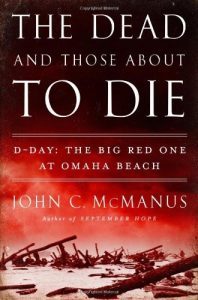 In honor of D-Day this year I picked up a copy of the John C. McManus account of the 1st Division’s assault on the eastern section of Omaha Beach, The Dead and Those About to Die.
In honor of D-Day this year I picked up a copy of the John C. McManus account of the 1st Division’s assault on the eastern section of Omaha Beach, The Dead and Those About to Die.
It’s an intense and gripping book, filled with detailed accounts of the harrowing obstacles and events, and tragedy and heroism. Just a great read, and full of examples of true leadership.
I had no idea that the men were so overloaded with equipment that it slowed them down. Time and again survivors reported that they had been weighed down with too much equipment, and felt that they wouldn’t have lost as many men if they could have moved faster. So many things went wrong — the aerial bombardment against German positions wasn’t very effective, the water was so choppy the special amphibious tanks sank, most of the boats were swept off course and into the worst possible places…
And yet somehow the men got off the beaches and took out the fortifications. In case you couldn’t already tell, this book has two thumbs up from yours truly. Highly recommended.
June 11, 2018
Updated Hard Writing Lesson: Word Count
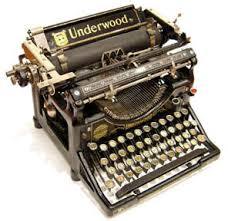 I’ve run out of time to write a lengthy essay this morning about my fourth book, so I’ll resume that series of essays next week. Today I thought I’d draft a brief note about another writing matter that’s been a challenge to me for years: word count.
I’ve run out of time to write a lengthy essay this morning about my fourth book, so I’ll resume that series of essays next week. Today I thought I’d draft a brief note about another writing matter that’s been a challenge to me for years: word count.
Like a lot of writers, once I got a steady writing gig I began to fret about my daily word count. It was always smaller than I wanted it to be. Some days I could get 4 or even 5 thousand words and occasionally much higher, but more often it was 3k or a little less. I last wrote about this in 2016, when I had realized that the overall weekly or even monthly word count was much more important than the daily word count.
That was an important realization, because it helped me stop getting frustrated every day when my words weren’t coming as fast as I thought they were supposed to arrive. I went so far as to read a number of books on writing faster to see if I could glean the secrets. I gleaned some, but I knew at that point that few writing tips are absolute. What works for one writer may not work for another — you have to be willing to try of course, but there are many different ways up the mountain.
 In the last half year my thoughts on word count have evolved even further. While it is always important to keep track of your word count overall and know how much you have to complete — and its crucial you stay on a steady course — the amount of writing you get done is a false sense of security if you have to constantly revise again and again. You’re losing time either at the front or the back. Maybe you’re one of those writers who can get it mostly right in the first couple of drafts while writing fast. I have had to admit that I’m usually not that guy.
In the last half year my thoughts on word count have evolved even further. While it is always important to keep track of your word count overall and know how much you have to complete — and its crucial you stay on a steady course — the amount of writing you get done is a false sense of security if you have to constantly revise again and again. You’re losing time either at the front or the back. Maybe you’re one of those writers who can get it mostly right in the first couple of drafts while writing fast. I have had to admit that I’m usually not that guy.
Instead, I am writing slower, and trying to get it more or less right the first time. And that means I have to be okay with a lower daily and weekly word count. When I look over a draft of a new scene and see that it mostly works just like it is, that’s fine solace. Now I probably couldn’t have done that a few years ago because I wasn’t as strong a writer, and I know I couldn’t do that if I didn’t already know my characters very well. Experience helps.
But I offer this hard lesson and state it succinctly: getting it right is much better than getting it fast. Remember that used bookstores and old magazines are stuffed full of old tales no one wants to read anymore because they were written fast and competently enough to sell. Rarely is something written fast and beautifully enough that people are still reading it decades on. You can cite me the outliers, so could I. But the odds are that you’re NOT an outlier. For your own sanity you should keep that in mind.
Whatever you do, experiment with the writing techniques and find the ones that work for you, and don’t chastise yourself if you work hard and don’t measure up to some arbitrary writing goal you’ve set. There are enough people out there who don’t want to be kind to you. Don’t let yourself be one of them.
June 8, 2018
Writer Chat: Nathan Long
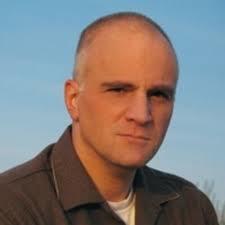 I’ve known Nathan Long for many years and I happen to think he’s long been one of the finest sword-and-sorcery writers active today, which is why I invited him to submit a tale for the second issue of Tales From the Magician’s Skull, and why I’ve been telling people — for years — that they really need to read his Blackhearts books.
I’ve known Nathan Long for many years and I happen to think he’s long been one of the finest sword-and-sorcery writers active today, which is why I invited him to submit a tale for the second issue of Tales From the Magician’s Skull, and why I’ve been telling people — for years — that they really need to read his Blackhearts books.
Nathan was kind enough to answer some questions about his work and the life of a writer, and I’m kind enough to share them with you.
Why don’t you give us a little background about yourself and your work?
I grew up in Pennsylvania and moved to Los Angeles after college to be a screenwriter. Though I had some minor successes, the Hollywood life grew less and less appealing, and when I was offered a chance to write novels for Warhammer, I jumped at the chance. Turned out novel writing was much more my speed, and I had a blast working in that world.
A few years later I managed to sell an original sci-fi novel and a sequel, and I thought I was on my way to a career as a novelist, but I had difficulty selling anything else, so I sought out other opportunities. Now I have the job my twelve-year-old self would have wanted, had it existed at the time. It’s the best job I’ve ever had. I write stories, dialog, and other bits and pieces for computer games.
The only downside is that I don’t do as much of my own writing anymore, but when your dream was to make a living as a writer and you’re making a living as a writer, you can’t really complain, can you?
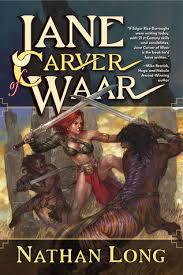 If you were going to direct readers to your fiction, what would you most like them to see?
If you were going to direct readers to your fiction, what would you most like them to see?
I guess I’d start with the Jane Carver novels, Jane Carver of Warr and Swords of Warr, which are the only completely original fiction I’ve published, and into which I poured all the things I like in fiction – high adventure, low humor, slapstick, snappy banter, and way way way too many metaphors.
After that I’d look for the Ulrika the Vampire novels, Bloodborn, Bloodforged, and Bloodsworn, and the Blackhearts novels Valnir’s Bane, The Broken Lance, and Tainted Blood, which are the two favorite series that I did for Warhammer. Both are darker than Jane, but still have their fair share of humor and high adventure.
Do you have some favorite writers? I’d love for you to discuss what you love about them, and what might be learned from studying their craft.
I have so many favorite authors, but I’ll try to narrow it down. Fritz Leiber was the first author that completely seized my imagination. I didn’t just love his Fafhrd and Grey Mouser books, I wanted to move to Lankhmar and live the life of a thief. From Fritz I got my love of low adventure, banter, and wild, poetic metaphor.
P.G. Wodehouse was the master of light farce, who wrote silly stories about the age of English country house weekends, spats, straw hats, and intimidating butlers. His stories are basically musical comedies without the music, and his prose is as bubbly as champagne. From Wodehouse I got my belief that the writer should give the reader something amusing to read every half-page or so.
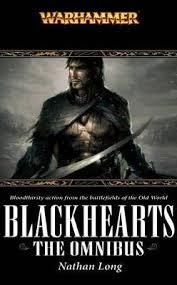 Raphael Sabatini wrote swashbucklers – Captain Blood, The Sea Hawk, Scaramouche, are all his. He was sort of the Tom Clancy of his day. He’s a bit old fashioned for modern readers, but nobody wrote a tighter plot or kept the tension going to the last page better, and always with flawless historical research to back it all up. From Sabatini I got my mania for tight, clockwork plots, and big emotional/romantic payoffs at the end of the book.
Raphael Sabatini wrote swashbucklers – Captain Blood, The Sea Hawk, Scaramouche, are all his. He was sort of the Tom Clancy of his day. He’s a bit old fashioned for modern readers, but nobody wrote a tighter plot or kept the tension going to the last page better, and always with flawless historical research to back it all up. From Sabatini I got my mania for tight, clockwork plots, and big emotional/romantic payoffs at the end of the book.
Sarah Waters writes historical novels, often set in the Victorian age. She too is a master of tight plotting, though her books are darker and more surreal. Though they are more internal dramas rather than adventure stories, you can see she has a secret love of penny dreadfuls and melodramas, and creates moods of delicious horror and dread. From her I am learning atmosphere and subtlety.
Hilary Mantel is another historical novelist, whose books Wolf Hall and Bring up the Bodies completely captivated me. If reading Sarah Waters is like taking opium, reading Hilary Mantel is like drinking strong black coffee. There is no romance in Mantel. Her writing removes the “otherness” from history and makes it real and mundane, in the best possible way. Her characters are normal people – not heroes and villains – driven by motives a modern reader will completely understand. From her I am learning clarity and avoiding stock characters – though I have a long way to go in that regard.
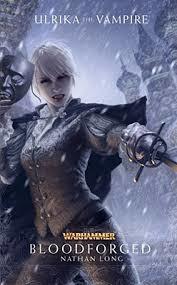 What writing projects are you working on right now?
What writing projects are you working on right now?
Other than the short story I wrote for Tale’s From the Magician’s Skull, I have no prose fiction going at the moment. All my writing is for games now, and I’m very proud of what I’m doing. If you’re a gamer, please check out Wasteland 2, which came out from InXile Entertainment two years ago, and Bard’s Tale 4, which is coming out later this year. Bard’s Tale is 100% my writing. Wasteland 2 is 80% me. Plus I wrote songs for both of them, and the Bard’s Tale songs were performed by some of the best traditional Scottish musicians working today. Coolest thing that’s ever happened to my words!
Dream writing project – if you could get paid to write anything, what would you most like to draft?
Nobody should write anymore Fafhrd and the Grey Mouser stories, but if anyone does, it should be me. Also, if any series was calling out for a few seasons on Netflix it’s Fafhrd and the Grey Mouser, and I am available to write it.
What do you most like to do when you’re not hunched over your computer screen crafting stories?
My current obsession is designing board games, and I have been spending my few spare hours puzzling over systems and mechanics and graphics, etc. I also love playing them, and my girlfriend and I get together with friends as often as we can for game nights.
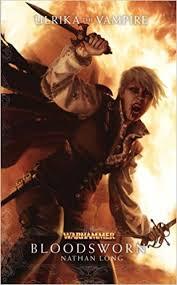 What are your favorite pieces of advice for other writers? Maybe advice you’d have wanted to hear a few years ago.
What are your favorite pieces of advice for other writers? Maybe advice you’d have wanted to hear a few years ago.
Here’s one that comes from personal experience. Be adaptable. I never thought I’d be novelist or a game writer. When I came to LA it was screenwriter or nothing, and out of stubbornness I stuck to that 10 years longer than I should have and got nowhere. If I had been more receptive to other ways of writing for a living, I may have had more success earlier on. I’m not saying you shouldn’t maintain your focus. I still want to write more novels and screenplays. But if you want to write for a living, keep an open mind. As long as it’s a paying gig, it’s a step in the right direction.
Nathan, thanks for coming by!
June 7, 2018
Writing Notecards
 Sometimes I re-learn writing lessons without pain. Or maybe I should say sometimes what I know is a good writing technique gets confirmed, because I actually remember to apply what I learned.
Sometimes I re-learn writing lessons without pain. Or maybe I should say sometimes what I know is a good writing technique gets confirmed, because I actually remember to apply what I learned.
Yesterday I had to run a bunch of errands on the far side of town. I grabbed my writing notebook just in case… and when I took the wife’s car in for an oil change saw that I’d be waiting a loooong time, because there were so many customers ahead of me. No worries, because I had the writing notebook.
Even better, I had some index cards. I got more plotting done there waiting for the oil change than I’d managed in the last month. Sometimes you have to have the right tools at the right time.
I don’t usually use notecards, but it’s a tool I’m aware of, and I know my friend Nathan Long uses them a lot in his own plotting. This time it worked like a charm for me. The middle section of the newest novel has been a little murky and I wasn’t sure about some of the order of events. I knew how things would start and how they’d end, and I knew a couple of other features. So I wrote each event down on a note card and as I thought about each and added detail, more events came to mind.
Once I had all the scenes written down a story arc started to take shape, both owing to logic (that can’t happen after this does, because then that dead character would still be alive) and just to dramatic momentum. The end result — the middle of the book is no longer a muddle and I’m eager to get started at revising/expanding it.
Once I had all that done I opened up the writing notebook and jotted a few notes about the overall flow and the arcs. Yay!
June 5, 2018
The Black Hack 2.0
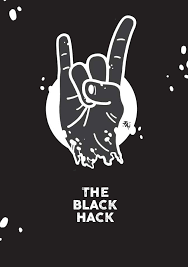 This is my first time mentioning The Black Hack, one of the MOST streamlined of fantasy role-playing games. Creative, intuitive, and short, The Black Hack took a new spin on the old D&D stats and settings and did very clever things with them. It inspired an entire movement of streamlined games, from pirate themed to space themed to horror themed to low-priced expansions and so on and so forth. It’s a great little system and can be had cheap ($2.00) through rpgnow right here. If you don’t believe me, read some reviews, or take the word of William King, creator of Gotrek and Felix, who was singing its praises to me earlier this week.
This is my first time mentioning The Black Hack, one of the MOST streamlined of fantasy role-playing games. Creative, intuitive, and short, The Black Hack took a new spin on the old D&D stats and settings and did very clever things with them. It inspired an entire movement of streamlined games, from pirate themed to space themed to horror themed to low-priced expansions and so on and so forth. It’s a great little system and can be had cheap ($2.00) through rpgnow right here. If you don’t believe me, read some reviews, or take the word of William King, creator of Gotrek and Felix, who was singing its praises to me earlier this week.
Bill’s also the fellow who pointed me towards the Kickstarter for the new, expanded edition of The Black Hack, which you can find here. Looks pretty groovy, and it, too, is stunningly affordable. I mean, look at the price for the complete PDF edition!
If you’re a long time gamer you really owe it to yourself to check it out. I’m going to sell off some stuff I’m never going to play again so I can “splurge” for the print edition. (I use “splurge” lightly, as the print edition before shipping is still only $40.)
June 4, 2018
Novel Lessons 3: The Bones of the Old Ones
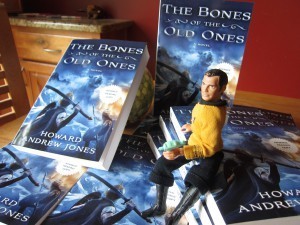 Three weeks ago I mentioned that it had taken me a year, writing in my spare time, to create the first Dabir and Asim novel, The Desert of Souls. Well, when it came to its sequel, it took just as long, even though I was writing full time. Sadly, it proved one of the most challenging books I’ve yet written, even though up until the most recent, unpublished novel, For The Killing of Kings, it was my favorite and the one of which I was most proud.
Three weeks ago I mentioned that it had taken me a year, writing in my spare time, to create the first Dabir and Asim novel, The Desert of Souls. Well, when it came to its sequel, it took just as long, even though I was writing full time. Sadly, it proved one of the most challenging books I’ve yet written, even though up until the most recent, unpublished novel, For The Killing of Kings, it was my favorite and the one of which I was most proud.
What went wrong? Well, that’s where the lessons come in.
First, I thought that my skeletal outline method was the way to go. It turns out that worked just fine for the first book, which was an origin story. I wanted to do something more complex with the second book now that my main characters were brothers in all but blood, and a wiser man than me should have realized that meant he needed a more complicated outline. I sure wish I could talk to that guy, because he would have saved himself and his poor, long suffering wife a whole lot of anguish.
You see, I ended up writing The Bones of the Old Ones no less than three times from almost start to finish. That certainly wasn’t my intent. Nearly everything about the plot changed apart from the general concept and the first three or four chapters. I had a strong beginning scene, but I cut it early on, and it took my wife and my editor, Pete Wolverton, some serious convincing to get me back to that start when I began it the third time.
Second, I only had a vague idea about my villains. I THOUGHT I knew them better than I did, but I was so eager to get started that I hadn’t thought them through very clearly. As a result I didn’t completely know their powers, or even their motivations. That was, frankly, an idiot move, because the middle got really muddy when I didn’t have an idea how the bad guys would be reacting to what was happening.
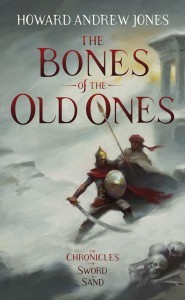 Third, I had plenty of cool characters but I wasn’t utilizing them enough. I didn’t realize until I was writing a rough of the cover copy for the publisher to use for marketing purposes that I could tighten the narrative and introduce one of the villains as an ongoing threat. In writing cover copy you’re generating what’s supposed to sound like a thrilling synopsis, and as I did so I suddenly understood that my plot wasn’t actually that thrilling for the first third. The characters needed more of an ongoing threat in the opening sections of the story. I changed the structure again, added some scenes, and strengthened the tale.
Third, I had plenty of cool characters but I wasn’t utilizing them enough. I didn’t realize until I was writing a rough of the cover copy for the publisher to use for marketing purposes that I could tighten the narrative and introduce one of the villains as an ongoing threat. In writing cover copy you’re generating what’s supposed to sound like a thrilling synopsis, and as I did so I suddenly understood that my plot wasn’t actually that thrilling for the first third. The characters needed more of an ongoing threat in the opening sections of the story. I changed the structure again, added some scenes, and strengthened the tale.
Each character needs to be doing interesting things. Shakespeare showed us this. Every one of his characters was portrayed by an actor, and so he tended to imbue all of them, even if they’re just walking on to kill a king for one scene, with a little bit of personality. That way each actor can have a moment. In part I’m sure that was so his company of actors would all enjoy their parts, but that’s also because it so much more interesting to see characters doing interesting things.
Fourth, I learned to start sharing my ideas and drafts with a trusted group of readers a little sooner. At least, I SHOULD have learned that. I told my wife I would after she had some brilliant feedback for me very late in the game to fix the ending (with some strong assistance from my agent, Bob Mecoy). If I’d talked things through with those I trust I could have saved myself a lot of pain. I thought I’d learned that lesson, but it was a mistake I’d repeat, even if it was to a slightly lesser extent, in future drafts. That stemmed from my own stubbornness in wanting to be self sufficient.
I don’t think you can tell what a pain in the butt that book was to write. The end result still makes me happy, although its a bittersweet joy. With their origin out of the way, Dabir and Asim could get on to weird and exciting and complicated adventures, and I had big plans for them. Alas, even with a starred review from Publisher’s Weekly, it didn’t sell very well. I was wrestling away with the third novel when the sales figures showed my editor and me that the writing was on the wall. Some day I want to at least finish that third Dabir and Asim and get it out there, probably self published, and I sometimes dream of finishing the whole series I had planned, but I suppose that will depend upon how much interest there is when I sell the third.
But that will have to wait until I get a new series going that will hopefully be much more successful, and then those readers will, also hopefully, be interested in reading my other work.
Next week I’ll take a look at my second Pathfinder novel, which I drafted during the months before Bones of the Old Ones was released.
June 1, 2018
Writer Chat: Aeryn Rudel
 Recently the talented Aeryn Rudel was kind enough to answer a slew of questions from me. I met Aeryn when he joined issue 1 to Tales From the Magician’s Skull. Not only did I enjoy his story, I’ve enjoyed all of our interactions. He’s a friendly and insightful guy and has been a big help behind the scenes. Here, get to know him a little yourself as I ask him some questions.
Recently the talented Aeryn Rudel was kind enough to answer a slew of questions from me. I met Aeryn when he joined issue 1 to Tales From the Magician’s Skull. Not only did I enjoy his story, I’ve enjoyed all of our interactions. He’s a friendly and insightful guy and has been a big help behind the scenes. Here, get to know him a little yourself as I ask him some questions.
First, why don’t you give us a little background about yourself and your work?
I’m a California kid currently weathering the rain and gloom in the Pacific Northwest and working as a freelance writer. I got my start in game design, writing for companies like Goodman Games and Wizards of the Coast. From there I switched to publishing, and I worked as a magazine editor and then as the managing editor for Privateer Press’ fiction line. So, I’ve seen the biz from both the editing and the writing side of things.
My writing tends toward horror and dark fantasy, and most of my work falls somewhere in or between those two genres, though I have been known to dabble with science fiction (and even mystery). While I enjoy writing long-form fiction, the short story is probably my favorite, especially flash fiction (stories under 1,000 words).
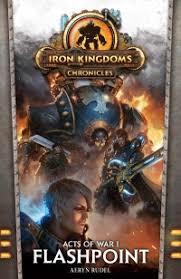 If you were going to direct readers to your fiction, what would you most like them to see?
If you were going to direct readers to your fiction, what would you most like them to see?
For horror, which is my primary genre these days, I’d point folks to the story “Night Games,” which combines two of my favorite things: baseball and monsters. Pseudopod did a great audio version of the story a while back, which you can find right here.
For fantasy, I’d direct people to the work I did for Privateer Press’ steam-powered fantasy world The Iron Kingdoms. I’ve got a lot of fiction in this setting, but the best place to start are the novels Acts of War: Flashpoint and Acts of War: Aftershock.
Finally, I run a blog called Rejectomancy, where I discuss the ups and downs of writing and the inevitable and copious rejections every writer suffers through at some point. It’s also a good place to find out more about my work if you’re so inclined. You can find it at www.rejectomancy.com.
Do you have some favorite writers? I’d love for you to discuss what you love about them, and what might be learned from studying their craft.
Stephen King has probably been the biggest influence. His workmanlike approach to writing really appeals to me, and I’ve always been amazed at how easily and quickly he can pull you into a story. I think his On Writing: A Memoir of the Craft is one of the best books of its type on the market, and it’s chock full of no-frills writerly wisdom.
Some of King’s quotes on the subject of writing and being a writer really resonate with me. Here are two of my favorites, and they kind of go together.
“If you wrote something for which someone sent you a check, if you cashed the check and it didn’t bounce, and if you then paid the light bill with the money, I consider you talented.”
“Talent is cheaper than table salt. What separates the talented individual from the successful one is a lot of hard work.”
What writing projects are you working on right now?
The big project is a horror novel called Late Risers. I recently finished the first draft, and I’ll soon begin the laborious process of revision. Then I’ll hand it off to my agent and cross my fingers we can make a sale.
In addition to the novel, I’m always working on short stories, and I currently have fifteen or so making the rounds with various publishers.
Dream writing project – if you could get paid to write anything, what would you most like to draft?
Well, the number one dream writing project is getting paid to write a long and ongoing series based on one of my novel/story ideas. That said, a large part of my writing career has been media tie-in. For those unfamiliar with the term, that just means writing in someone else’s intellectual property, like the Iron Kingdoms or Star Wars. There’s one property I would love to write for, you know, if they produced fiction and (big) if I could land a gig like that. The property is Fallout, currently produced by Bethesda Softworks. I love the games and the cool post-apocalyptic world, and it would be a blast to pen a story or two in that setting.
 What do you most like to do when you’re not hunched over your computer screen crafting stories?
What do you most like to do when you’re not hunched over your computer screen crafting stories?
Like many writers I have more hobbies than I need/have time for, but here’s a quick rundown of some of my favorites:
The gym. Yeah, I know it doesn’t sound like a hobby, but hear me out. First, when you sit on your butt hunched over a keyboard eight to ten hours a day, getting up and moving around vigorously is kind of a necessity. Second, for some reason, I get a lot of my best story ideas at the gym. Something about sweat and pain just make me feel creative, I guess.
Star Wars Lego. Maybe more of an obsession than a hobby. Here’s how bad it is. My collection of books is slowly being displaced by my collection of Lego (gasp!). I often try to foist old sets on friends and family just to make room for the new stuff I keep buying. So, if you ever visit my home, you’ll probably leave with a Lego X-Wing or something.
HEMA. Historical European Martial Arts. Basically fencing with longswords and other historical blades. I love doing this, but a host of nagging injuries have kept me away from it for a while. See hobby #1. It’s a lot of fun and great exercise, and, well, knowing which end of the sword is the dangerous part is pretty damn helpful when you write fiction about folks who, uh, use swords.
Gaming. I don’t get to do this nearly as much as I’d like, but I still get in the odd session. Dungeons & Dragons is my favorite, but I’ve got a soft spot for Call of Cthulhu, the old-school Vampire: The Masquerade, and, more recently, Necromunda.
What are your favorite pieces of advice for other writers? Maybe advice you’d have wanted to hear a few years ago.
It seems a large portion of the internet is given over to writing advice, often proclaiming the ONE TRUE WAY to write and get published. So, one of the best pieces of writing advice I’ve received is there is no one true way, only what works for you. Sure, talk to other writers, discuss your process with them (see my second piece of advice), and if something they do resonates with you, do it. But don’t feel like you need to ape the process of any successful writer to be successful yourself.
The second piece of advice I would give is something that has helped me quite a lot. I think it’s important for authors to seek out other authors who can act as both critique partners and a support group. Writing can be a tough and lonely business, and rejections are both frequent and numerous. If you have a group of folks who can help you sharpen your work, share in your successes, and sympathize with your struggles, then I think you have a good foundation for success.
Thanks, Aeryn. It’s been a real pleasure.
May 31, 2018
Doomsday Music
 So here’s a cool thing. If you’re a musician, or music scholar, and happen also to be a fan of the original Star Trek, boy, do I have a link for you.
So here’s a cool thing. If you’re a musician, or music scholar, and happen also to be a fan of the original Star Trek, boy, do I have a link for you.
I’ve long said that the original Star Trek had some of the finest, most memorable music for any television series, ever. I’ve sometimes wondered if it’s so hummable just because I’m used to it, having seen the shows so many times, but I don’t think that’s the real story. There truly was gripping background music tracked through the first two seasons, and among the finest was the music originally composed for my favorite episode, “The Doomsday Machine,” and used in numerous episodes thereafter.
Here’s a link to a great video by musician Shem von Shroeck. For the first nine minutes he dissects the musical cues and leitmotifs from composer Sol Kaplan’s score for “The Doomsday Machine.” If you really want to go deeper into the weeds, following on that is a version of the actual episode with musical commentary, so you can hear even more clearly all the clever stuff Kaplan was doing.
It’s a pretty nifty analysis, and if any of this sounds of remote interest, you really ought to take a look. Or, rather, listen.
May 30, 2018
Mighty Warriors Arrive
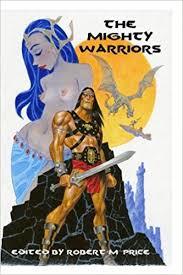 My brand new copy of The Mighty Warriors turned up in the post yesterday. I can’t remember when I had a NEW anthology chock full of sword-and-sorcery. I mean, I’ve had old anthologies that were new to me, but not one that was hot off the presses.
My brand new copy of The Mighty Warriors turned up in the post yesterday. I can’t remember when I had a NEW anthology chock full of sword-and-sorcery. I mean, I’ve had old anthologies that were new to me, but not one that was hot off the presses.
I’ve been friends with two of the authors for years, Charles Rutledge and Paul McNamee. Charles is the fellow who spoke so highly of Shotokan karate and therefore helped me choose which school to attend many years back (and I’m STILL there). I’ve known Paul since I used to edit the old Flashing Swords e-zine. He helped manage the related web site for a while when I was busy with grad school. Yet I’ve never read any of their work! Now I have the chance, because they both have a story in the volume, along with one of my favorite writers, Charles Saunders, my friend David C. Smith. There’s also work by friendly acquaintances and industry standard bearers. I’ve been hearing good things about Adrian Cole’s Elak pastiches for a while, so I’m particularly interested to see what he’s cooked up.
Anyway, I’m pleased to have a copy and eager to get to reading. Your own copies can be found here.
May 28, 2018
Novel Lessons 2: Plague of Shadows
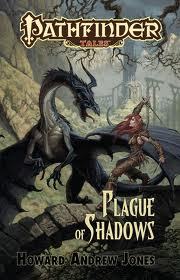 Maybe I should label this novel as “2.5” because I’d started my second Dabir and Asim novel, The Bones of the Old Ones, before I set to work on Plague of Shadows. But I set Bones aside and gave this one my attention all through the summer.
Maybe I should label this novel as “2.5” because I’d started my second Dabir and Asim novel, The Bones of the Old Ones, before I set to work on Plague of Shadows. But I set Bones aside and gave this one my attention all through the summer.
I didn’t write it as I’d written my first novel, in part because as a work-for-hire, I had to be present an extremely detailed outline and get it approved before I started working. That meant I had a pretty solid blueprint, even though that blueprint ended up changing a lot as I went. It was a little harder than my first novel, but not so hard as the next one would be, probably because of that outline, one that a talented editor had provided me with feedback for.
Why was it a little more difficult? Well, the characters and their relationships were all brand new to me, so it took a little writing and rewriting to get used to them and how they’d react, something I hadn’t had to do much with The Desert of Souls.
The most obvious lesson in writing Plague was to be flexible. Somehow I managed to roll with the punches on this one far faster than I’d roll with challenges in later books. I was about a third of the way into the draft, about 30 thousand words, when I heard from James Sutter. James, by the way, is a great editor — and a talented writer as well — and this wasn’t at all his typical way of communicating. But the Paizo Pathfinder novel line was new, and they were still working on marketing. He said that they had realized that novels with dragons on the cover sold better and asked if I could work some dragons into the plot. I said sure, I already had one, but he wondered if I could have a big fight with a dragon. So I said sure, why not? And I found a way, and I think it ended up strengthening the book.
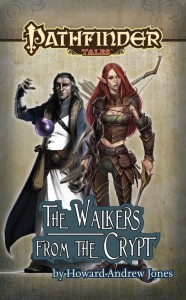 That’s a nice thing about James — he’s always been dead-on accurate with his suggestions for my work, and his ideas always strengthened the narrative. This one did too, even if it wasn’t founded on character action and development, as his feedback almost always is otherwise.
That’s a nice thing about James — he’s always been dead-on accurate with his suggestions for my work, and his ideas always strengthened the narrative. This one did too, even if it wasn’t founded on character action and development, as his feedback almost always is otherwise.
I also learned I could vary my approach. I structured the novel with two parallel arcs, one set in the past and one in the present, with key moments from the arc in the past turning up at just the right moment in the present so readers could — hopefully — see how the present got the way it was. It was a method of not frontloading the backstory, revealing only what was necessary at the time. I’ve never done it again, although I tried it with an earlier draft of a later book. It worked here.
The other lesson I learned was that people aren’t always going to take away from the novel what you intended. Some of the reactions to The Desert of Souls confounded me, yes, but some of the reactions to Plague of Shadows confounded me more. When it came to unkind comments about Desert, it was from a handful who thought that the characters were wooden, I think because Dabir and Asim don’t spend time discussing their internal states, or that there weren’t enough women in my novel about how a close friendship develops between two men.
The responses to Plague, while mostly positive, ran the gamut. Some saw it as an adventure romp with a little more character depth and some surprising turns, which is what I’d been trying for. Others didn’t see anything special in it at all, or took issue that with this or that game related thing, or umbrage that it wasn’t as they’d expected or that there wasn’t enough magic, or what have you. Honestly, some of the dismissive reactions or criticism that felt just flat-out wrong were a little hurtful. I learned not so seek out reviews and, most of all, to develop a thicker skin.
I also learned that tie-in novels just don’t ever get as much review time as creator-owned novels. I thought I was going to be okay with that after I got over the surprise, but I’d realize later, with another Paizo novel, that I wasn’t. If you’re going to be writing them, you’d best get used to that.
I also learned that yes, I could write more than one kind of story, and that I could write third person as easily as first person. I gained confidence, and I thought I could write novels quickly. When I returned to drafting the next Dabir and Asim novel I was to learn that just wasn’t true.
Howard Andrew Jones's Blog
- Howard Andrew Jones's profile
- 368 followers



